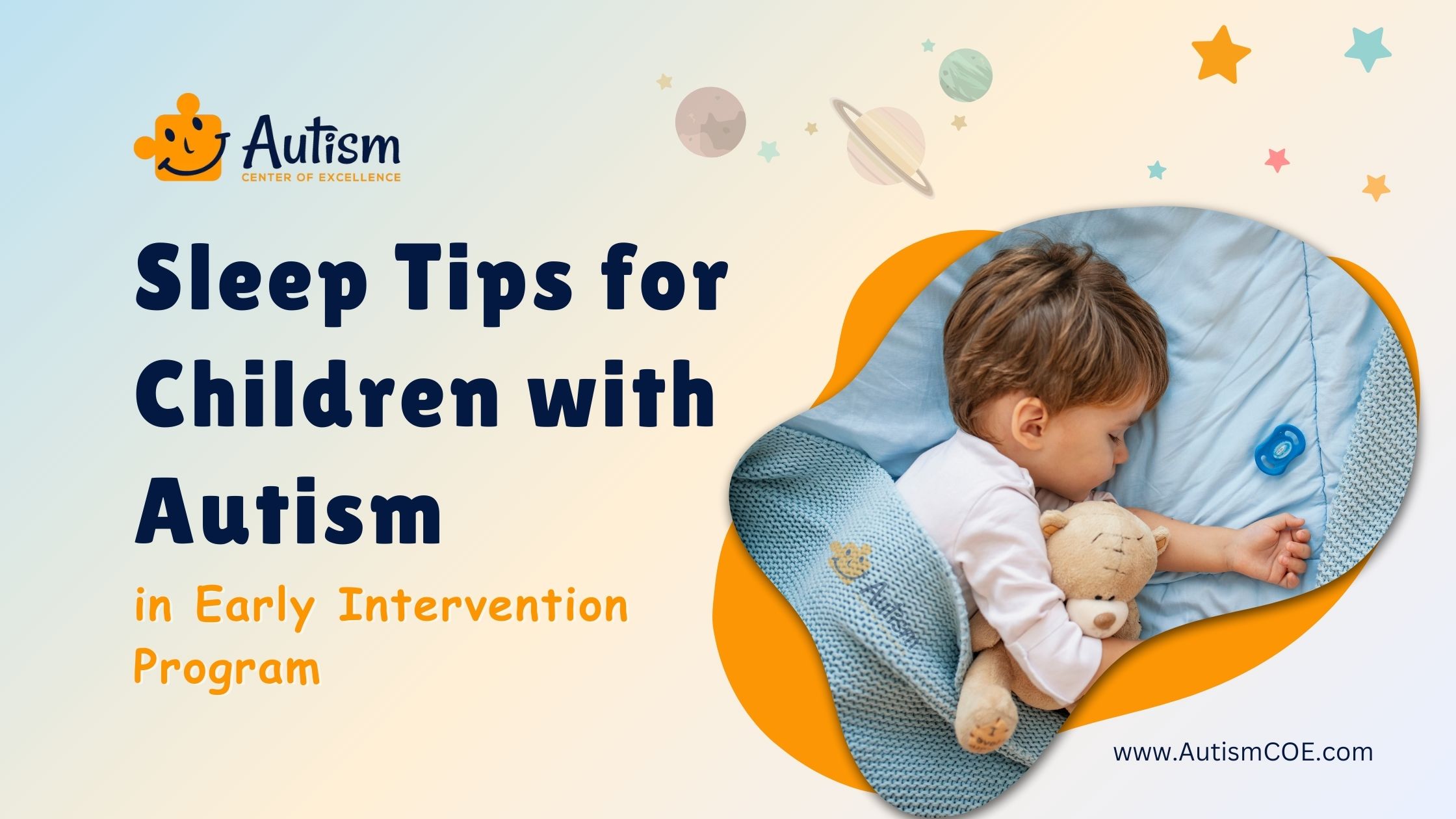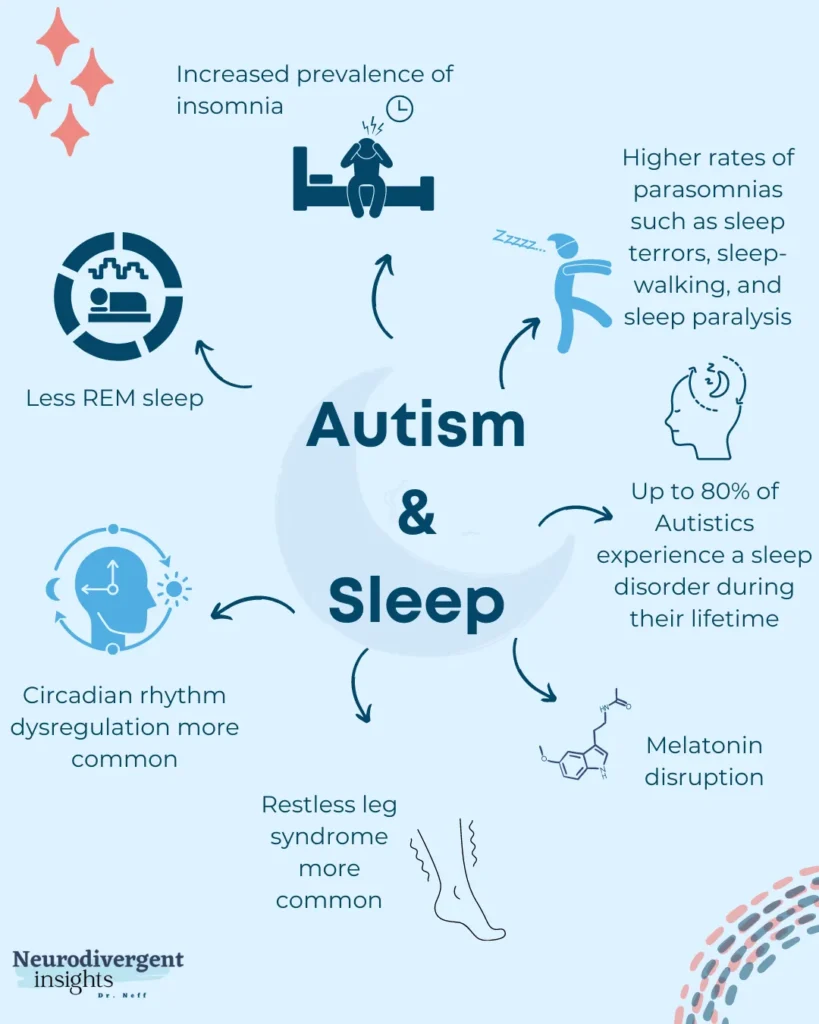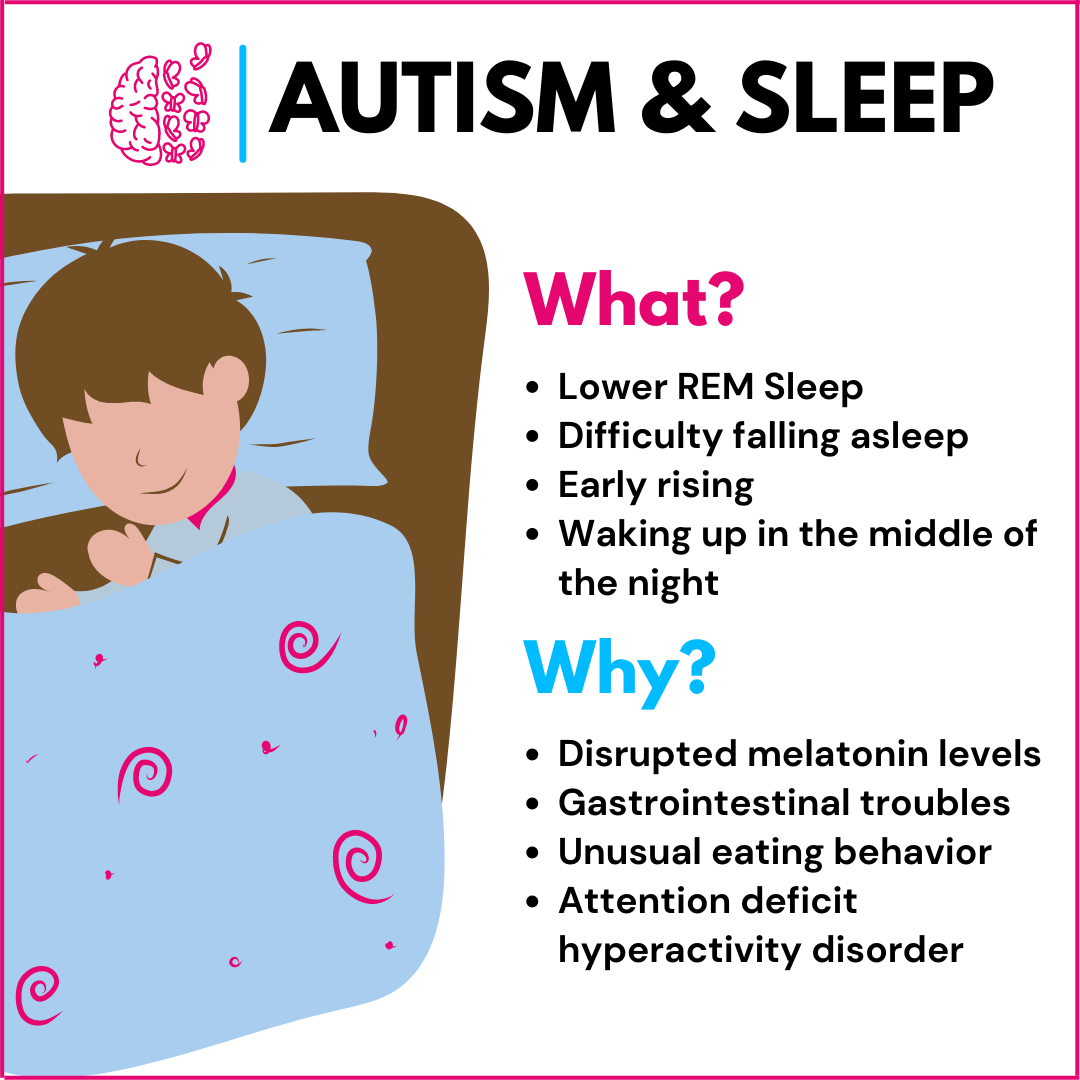Sleep is essential for everyone, but for those with autism, it can be a particularly elusive necessity. You might have noticed the challenges that come with bedtime if you or a loved one is on the autism spectrum.
Sleepless nights and restless evenings can affect more than just mood—they can impact daily functioning, learning, and overall health. Imagine a world where you could transform these sleepless nights into peaceful rest, where both you and your loved one wake up refreshed and ready to embrace the day.
This article delves into the intricate relationship between autism and sleep, offering insights and practical tips to help improve sleep quality. Stick with us, and discover how small changes can lead to big improvements, making nights calmer and days brighter.

Credit: autismcoe.com
Impact Of Autism On Sleep Patterns
Understanding the impact of autism on sleep patterns is crucial for anyone living with or caring for someone with autism. Sleep is essential for health and wellbeing, but people with autism often face unique challenges that can disrupt their rest. If you’re noticing irregular sleep patterns in yourself or a loved one with autism, you’re not alone. Let’s dive into some common challenges and factors affecting sleep for those on the autism spectrum.
Common Sleep Challenges
Many individuals with autism experience difficulties falling asleep and staying asleep. You might notice frequent awakenings during the night, which can lead to feeling tired the next day. Some people might even struggle to recognize when they need rest, making bedtime a challenge.
Bedtime routines can be particularly hard. Creating a peaceful environment is essential, but sensory sensitivities can make this difficult. Bright lights, certain textures, or noises might be disruptive. Have you tried adjusting these elements to see if it improves sleep quality?
Insomnia is another common issue. The inability to fall asleep can be frustrating and lead to anxiety about bedtime. Consider implementing calming activities before sleep, such as reading a favorite book or listening to soothing music.
Factors Affecting Sleep
Several factors can influence sleep patterns for those with autism. Anxiety and stress are significant contributors. If you’re feeling anxious, your mind might race at night, making it hard to relax. Techniques like deep breathing or meditation can help ease this tension.
Melatonin levels also play a role. Some individuals with autism have lower levels of this sleep hormone, which can make falling asleep more challenging. Have you discussed melatonin supplements with a healthcare provider as a possible solution?
Environmental factors like room temperature and lighting can impact sleep too. A cooler, darker room often promotes better sleep. Consider black-out curtains or a fan to create a more restful atmosphere.
Dietary habits might also affect sleep. Consuming caffeine or sugar close to bedtime can disrupt sleep patterns. Have you observed how certain foods or drinks influence your sleep quality?
Addressing these factors can significantly improve sleep patterns for individuals with autism. Have you tried any of these strategies, and if so, what worked best for you?
Strategies For Better Sleep
Improving sleep for individuals with autism involves consistent routines and calming bedtime rituals. Creating a comfortable sleep environment can make a big difference. Limiting screen time and reducing noise helps promote a restful night’s sleep.
Autism can significantly impact sleep patterns. Many individuals with autism experience challenges falling asleep or staying asleep, affecting their overall well-being. If you or a loved one faces sleep difficulties related to autism, adopting effective strategies can make a difference. Let’s dive into practical approaches that can help improve sleep quality.
Establishing A Routine
Creating a consistent bedtime routine is crucial. It signals to the body that it’s time to wind down. You might start with a calming activity like reading or listening to soft music. Stick to the same sleep and wake times every day, even on weekends. This helps regulate your body’s internal clock. Over time, your body will adapt to this schedule, making it easier to fall asleep. If bedtime routines feel overwhelming, start small. Choose one activity, like brushing teeth, and gradually build on it. Consistency is key, but it’s okay to adjust based on individual needs.
Creating A Sleep-friendly Environment
A comfortable sleep environment can promote better rest. Consider the room’s lighting; dim lights signal that it’s time to sleep. You may find blackout curtains helpful to block external light. Noise levels can also impact sleep. White noise machines or fans can help drown out disruptive sounds. Experiment with different options to see what works best. Temperature matters too. A cool room is ideal for sleeping. Adjust the thermostat or use a fan to maintain a comfortable temperature. Think about your mattress and pillows. Are they comfortable? Sometimes, investing in new bedding can make a world of difference in sleep quality. Have you tried any of these strategies for better sleep? What changes made the biggest impact? Let me know your thoughts and experiences in the comments below.
Role Of Diet And Nutrition
Understanding the role of diet and nutrition can significantly affect sleep patterns in individuals with autism. A balanced diet supports overall health and well-being, influencing sleep quality. Foods rich in essential nutrients and vitamins can help improve sleep. Conversely, certain foods may disrupt sleep, leading to restlessness.
Foods To Promote Sleep
Some foods naturally encourage better sleep. Warm milk contains tryptophan, an amino acid promoting relaxation. Bananas are another excellent choice. They are rich in magnesium and potassium, which help muscles relax. Oats contain melatonin, a hormone regulating sleep cycles. Adding these to your child’s evening snack might enhance sleep quality.
Supplements And Sleep
Supplements can also play a role in improving sleep. Melatonin supplements are popular for regulating sleep patterns in autistic individuals. Consult a healthcare professional before starting any supplements. Magnesium supplements may help with sleep by relaxing muscles. Omega-3 fatty acids are another option. They support brain health and can improve sleep quality.

Credit: neurodivergentinsights.com
Therapeutic Approaches
Understanding the connection between autism and sleep can be a challenging puzzle. Yet, therapeutic approaches offer promising ways to improve sleep quality for individuals with autism. Whether through behavioral strategies or alternative methods, these therapies can make a significant difference. Have you ever wondered how specific techniques might change sleep patterns? Let’s explore some practical approaches that could potentially enhance restful nights.
Behavioral Therapy
Behavioral therapy focuses on modifying actions to improve sleep. Techniques such as consistent bedtime routines can establish a calming atmosphere. Setting a regular schedule helps signal the body that it’s time to wind down.
Strategies like visual schedules or bedtime stories may assist in easing anxiety around sleep. You might find that a simple story or picture guide can help your loved one transition more smoothly to bedtime. Reinforcement methods can also encourage positive sleep habits.
Consider using rewards for sticking to bedtime routines. This approach not only motivates but also celebrates small victories. Observing changes over time can be incredibly rewarding. Would you like to see how these strategies can unfold in real life?
Alternative Methods
Exploring alternative methods might reveal unexpected solutions to sleep challenges. Have you tried incorporating sensory tools to create a more conducive sleep environment? Weighted blankets or soft lighting can offer soothing effects.
Relaxation techniques such as deep breathing exercises or gentle yoga may also promote tranquility. These activities can serve as calming rituals before sleep. You might be surprised at how a few minutes of stretching or breathing can transform bedtime.
Dietary adjustments may impact sleep quality as well. Some parents have noted changes when certain foods are included or excluded from evening meals. Could a change in diet be the key to unlocking better sleep for your loved one?
Each therapeutic approach offers unique benefits. What might work for one person may differ for another. It’s essential to tailor strategies to individual needs, encouraging experimentation with different methods. Which approach resonates most with you, and how might you adapt it to fit your situation?
Technology And Sleep Aids
Technology helps improve sleep for autistic individuals. Devices like white noise machines and specialized apps create calm environments. These tools assist in developing better sleep habits, reducing anxiety, and enhancing overall sleep quality.
Autism can present unique challenges when it comes to sleep. Thankfully, technology and sleep aids offer promising solutions. Devices and apps can help track sleep patterns, create calming environments, and assist individuals on the autism spectrum in achieving restful nights. But how can these technologies make a real difference in your life or the life of someone you care about?
Sleep Tracking Devices
Sleep tracking devices can be a game changer. They provide insights into sleep patterns, helping identify problems like frequent wake-ups or insufficient deep sleep. For someone with autism, understanding these patterns can be crucial in making necessary adjustments. Consider devices like wristbands or smartwatches that monitor movement and heart rate. They can alert you to disturbances in sleep cycles. These insights empower you to tweak routines or environments for better sleep quality. Do you or your loved one often wake up feeling unrested? A sleep tracker might reveal that the issue lies in the number of times sleep is interrupted. By identifying these patterns, you can take proactive steps to improve sleep quality.
Apps And Tools
Apps and tools designed for sleep support can be incredibly helpful. They offer features like guided meditation, white noise, and bedtime stories tailored for individuals with autism. These features can create a calming pre-sleep routine. Apps like Calm or Headspace provide guided relaxation exercises. These can help ease the transition to sleep. They offer structured, soothing activities that can reduce anxiety and promote relaxation. Have you considered using an app to establish a consistent sleep routine? Consistency is key for many on the autism spectrum, and technology can provide the structure needed to maintain it. With reminders and gentle prompts, apps can assist in creating a peaceful bedtime environment. By leveraging technology and sleep aids, you can transform sleep from a nightly struggle into a restful experience. What tools or devices have you found helpful in your journey? Sharing your experiences could offer others the hope and inspiration they need.
Support Systems
Support systems play a crucial role in managing autism and sleep challenges. Proper support can improve sleep patterns for individuals with autism. Families, caregivers, and communities create a strong network of support. This network offers emotional and practical help. These support systems help navigate the complexities of autism and sleep.
Family And Caregiver Support
Family members often serve as the primary support system. They provide comfort and stability. A consistent bedtime routine is vital. It helps create a calming environment. This routine can include soothing activities. Reading or listening to gentle music works well. Caregivers must understand the unique needs of individuals with autism. They need patience and empathy. These qualities are essential for effective support.
Community Resources
Community resources offer additional layers of support. Local autism support groups can be invaluable. They provide opportunities to share experiences. Parents and caregivers can learn from each other. Professional guidance is also available. Therapists and sleep specialists can offer strategies. Workshops and seminars can educate families about autism and sleep. Libraries and community centers often host these events. Access to these resources can make a significant difference.

Credit: www.xcode.life
Frequently Asked Questions
How Does Autism Affect Sleep?
Autism can impact sleep patterns due to sensory sensitivities and anxiety. Many individuals with autism experience difficulty falling asleep or staying asleep. Establishing a consistent bedtime routine and reducing sensory stimuli can help improve sleep quality. Professional guidance might also be beneficial in addressing specific sleep challenges related to autism.
What Sleep Problems Are Common In Autism?
Common sleep problems in autism include insomnia, sleep apnea, and difficulty staying asleep. Sensory sensitivities and anxiety often contribute to these issues. Implementing a calming bedtime routine and creating a comfortable sleep environment can help. Consulting a healthcare professional for tailored strategies might also be beneficial.
Can A Bedtime Routine Help Autistic Children?
A consistent bedtime routine can significantly help autistic children improve their sleep. Predictable routines provide a sense of security and reduce anxiety. This can make it easier for children to relax and fall asleep. Including calming activities like reading or listening to soothing music can enhance its effectiveness.
Why Is Melatonin Used For Autism-related Sleep Issues?
Melatonin is often used to help regulate sleep-wake cycles in individuals with autism. Some people with autism produce lower levels of melatonin, affecting their sleep patterns. Supplementing with melatonin can aid in falling asleep and improving sleep quality. It’s important to consult a healthcare provider before starting any supplement.
Conclusion
Sleep plays a vital role in autism. Better sleep improves daily life. Parents can try routines to help their child sleep better. Consistent bedtime and calming activities might work. Understanding sleep needs can ease stress. Patience and observation are key.
Professionals can offer guidance. Every child’s needs are unique. Tailored strategies often bring the best results. Good sleep can enhance mood and focus. With time, things can improve. Small changes make a difference. Support is available for families. Remember, quality rest matters.
A good night’s sleep benefits everyone.
